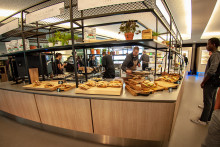Originally hailing from the region of Provence in the South of France, Marmottant is preparing to head home. As he puts it, `I would like to live closer to family and friends…within my native French culture, and enjoying the scenic places where people and landscape meet. If I can choose the location, my preference goes to the southeast of France (Provence and the Alps) an area whose charms I am not bored with. These dreams would be realized in Marseille or Grenoble, where large scientific complexes are present.'
Marmottant is currently in the process of seeking an academic researcher position in a CNRS (Centre National de la Recherche Scientifique), a national institute where the bulk of French scientific research is done. Marmottant elaborates, `It is also performed in universities, but the teaching duties are such that little time is left for research. The CNRS researchers do not have to teach at all, and have a permanent position as state employees, but not an incredible salary.'
In such a CNRS, Marmottant intends to work on the interaction of fluids and soft matter like biological cells on microscales. He is enthusiastic about the topic, `I think there is a lot to understand and to do in this direction. This topic provides the opportunity of cooperation with different scientific communities, microtechnology and biology. Possible applications are biotechnological (parallelized analysis, sorting and treatment of cells in vitro) and medical (drug delivery, ablation of sick cells).'
To seek a position at a Dutch university or institute, the standard procedure is rather straightforward: candidates answer advertisements for particular positions. The job-seeking process Philippe has undergone differs dramatically. Marmottant explains, `To become a CNRS researcher, the candidate applies by presenting his curriculum vitae and a research project for a lab of his or her choice, which can be anywhere in France. The candidate is then evaluated by one of the forty committees (composed of two-thirds of CNRS researchers), each representing a scientific topic, ranging from Mathematics to Anthropology. These committees are composed of 21 members: 14 are CNRS researchers elected by their colleagues, 7 are named by the Ministry of Research. The selection begins with a written file submitted for evaluation in January. In the spring, qualified candidates are interviewed in Paris by CNRS committees. The candidate is allowed 10-15 minutes to present himself and his research project; 10-15 minutes are left for questions. The jury then deliberates and issues a ranking list. This first list is then considered by the Ministry of Research, which may modify it to boost some specific area of research. Finally, the Ministry issues an admission list for state employee positions.'
Such a complicated and centralized system strikes the casual observer as somewhat excessive, but Marmottant maintains that it allows all scientific disciplines to be sustained, feeding labs nationwide with new researchers selected from a wide range of candidates, including French-speaking foreigners. Still he admits that there are cons, `Very few positions are available each year in a given scientific topic (5-10 positions granted to junior scientists younger than 31, who usually number more than 100) and the quasi-impossibility to be selected after age 31 (only one or two positions for senior scientists). Doing more than one post-doc is therefore extremely risky if you want to obtain a position.'
Marmottant observes that ultimately what really counts is the support the job applicant gets from the lab where he or she applies, as well as the `weight' of the lab, the biggest and renowned ones being more influential. Thus, it is crucial that job candidates maintain or develop ties with the lab they are considering through visits, seminars or collaborations. Marmottant adds, `The support of very influential people can be determinant in this process, so personal connections are definitely a plus.'
Certainly the French CNRS system has its strengths, but those of you currently seeking positions within the Dutch scientific community may breathe a sigh of relief that the process here is not as arduous.








